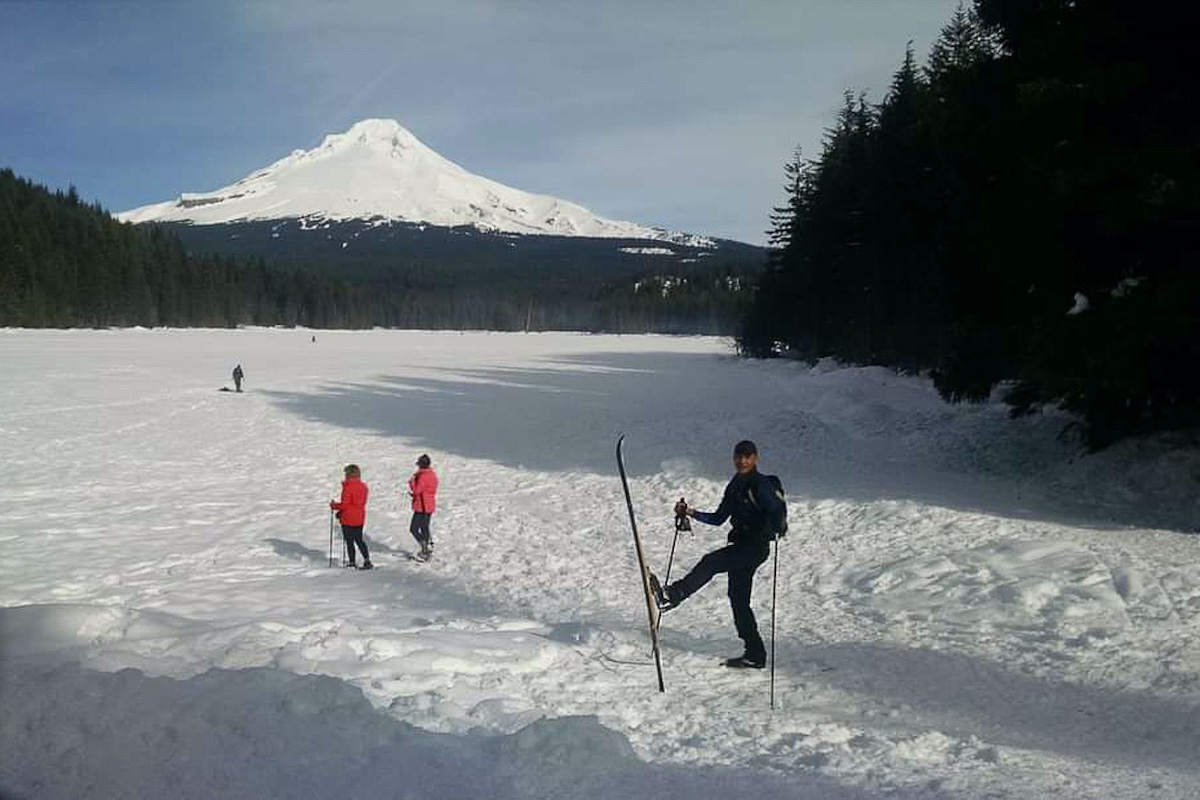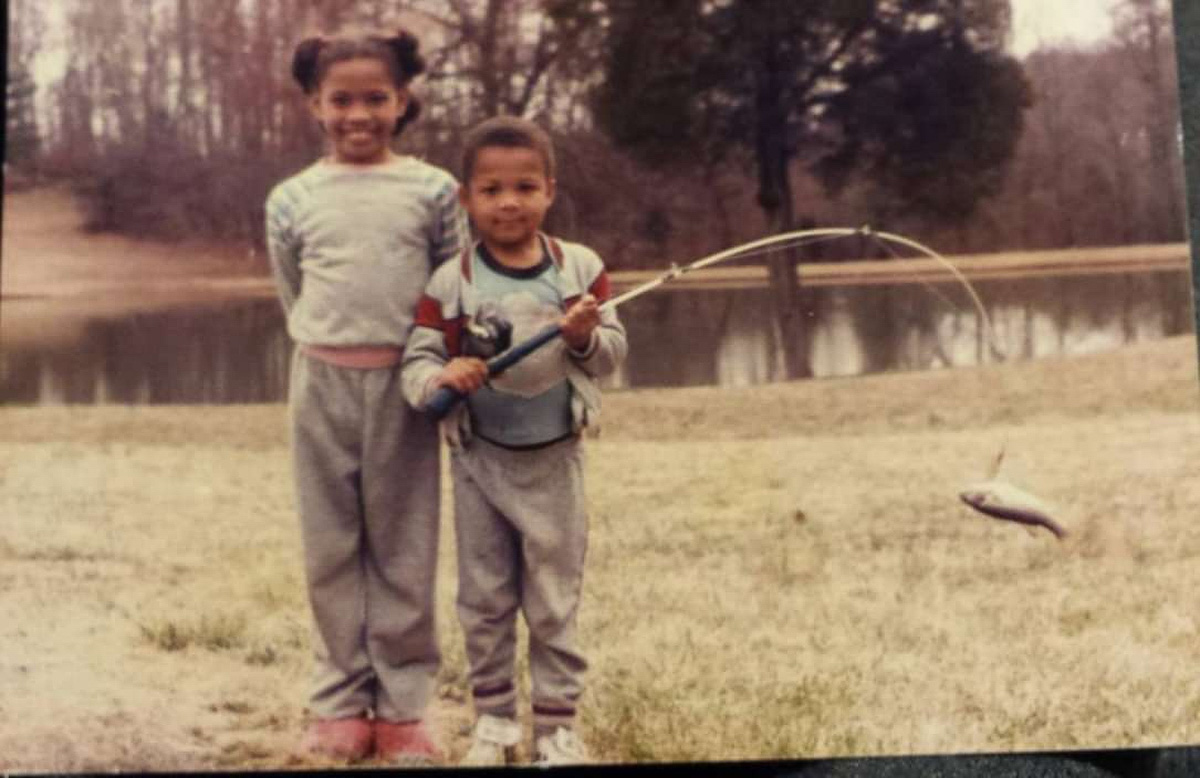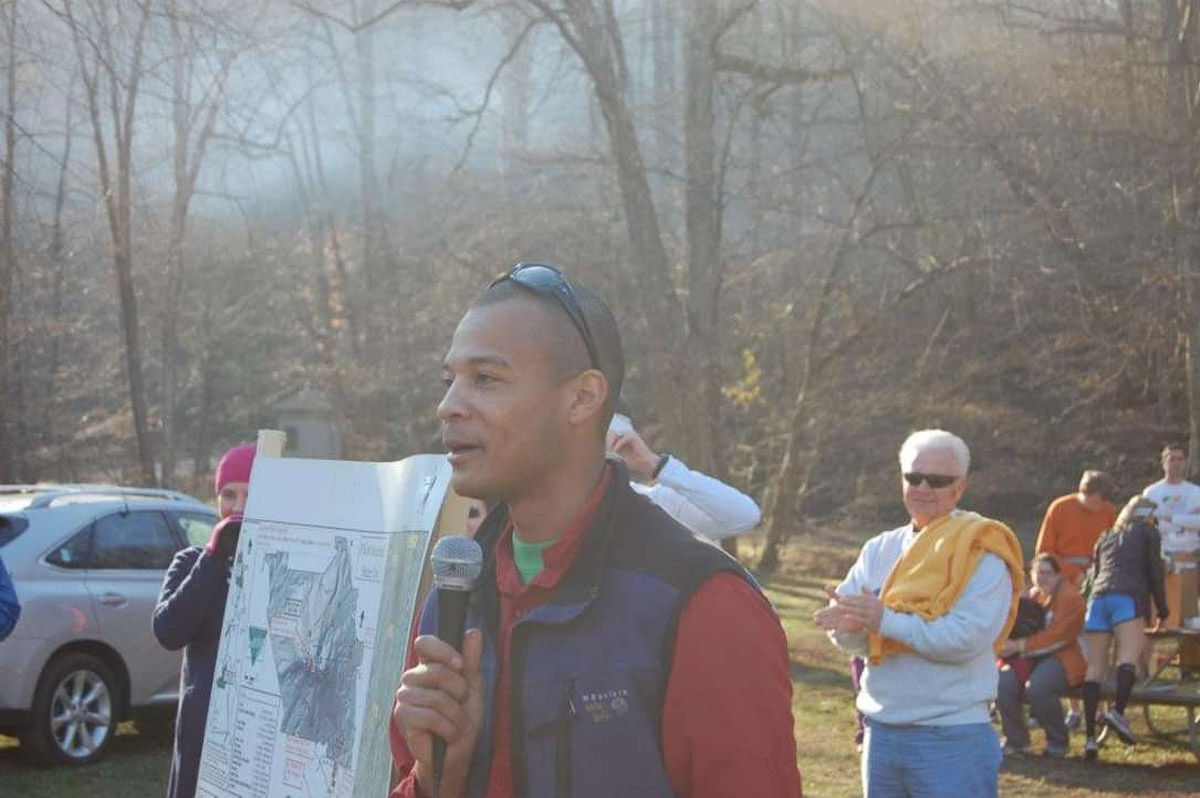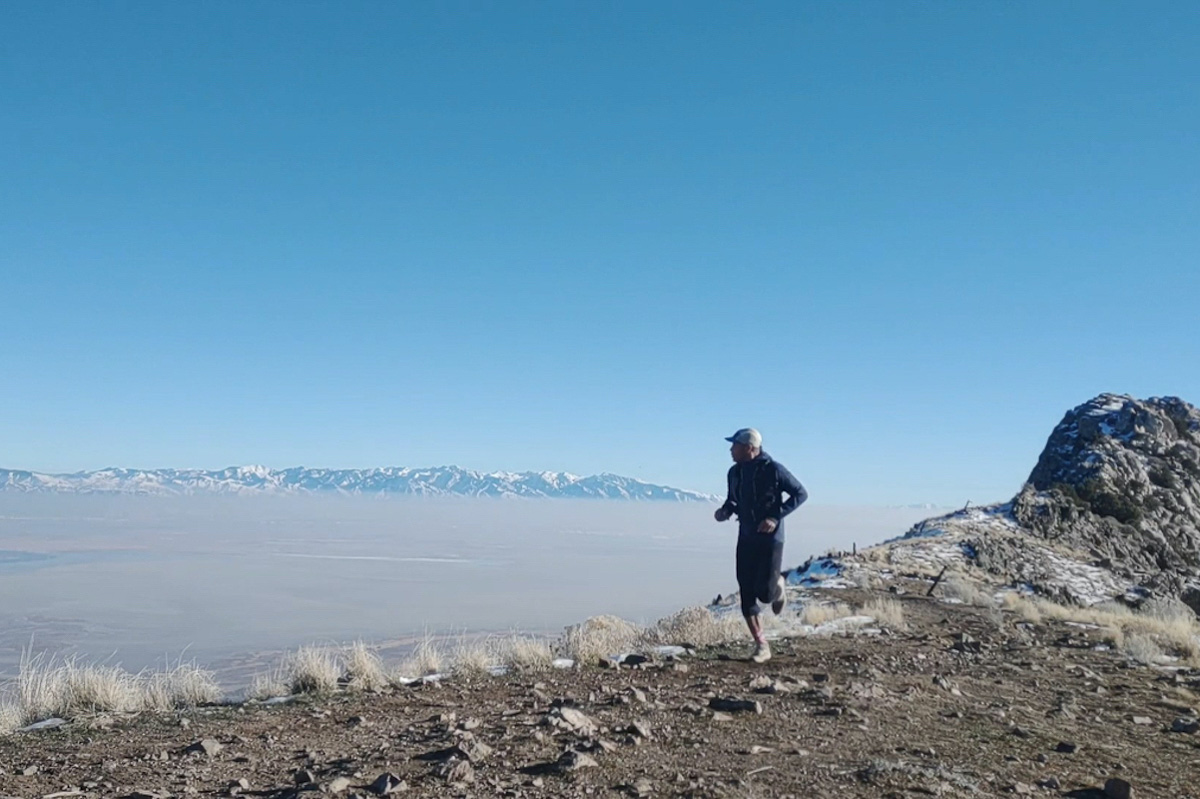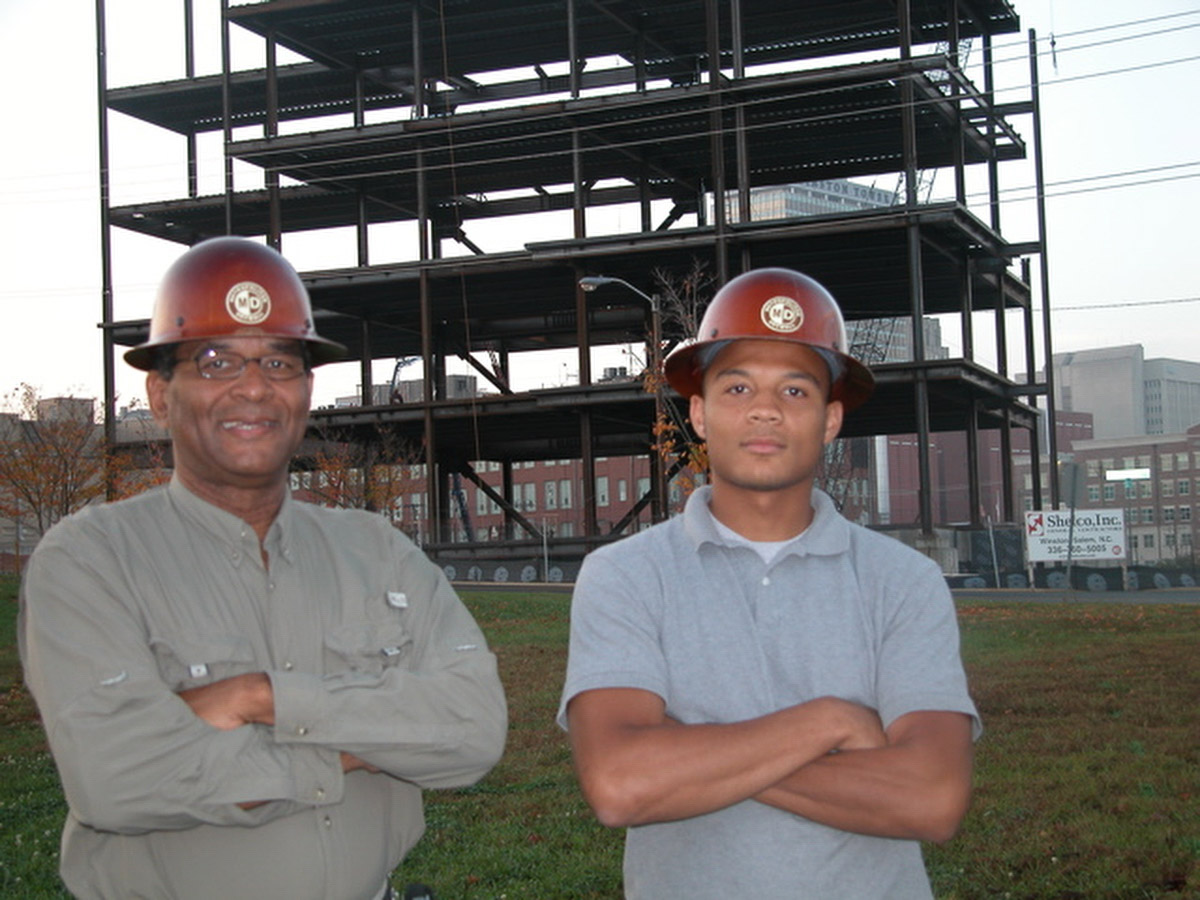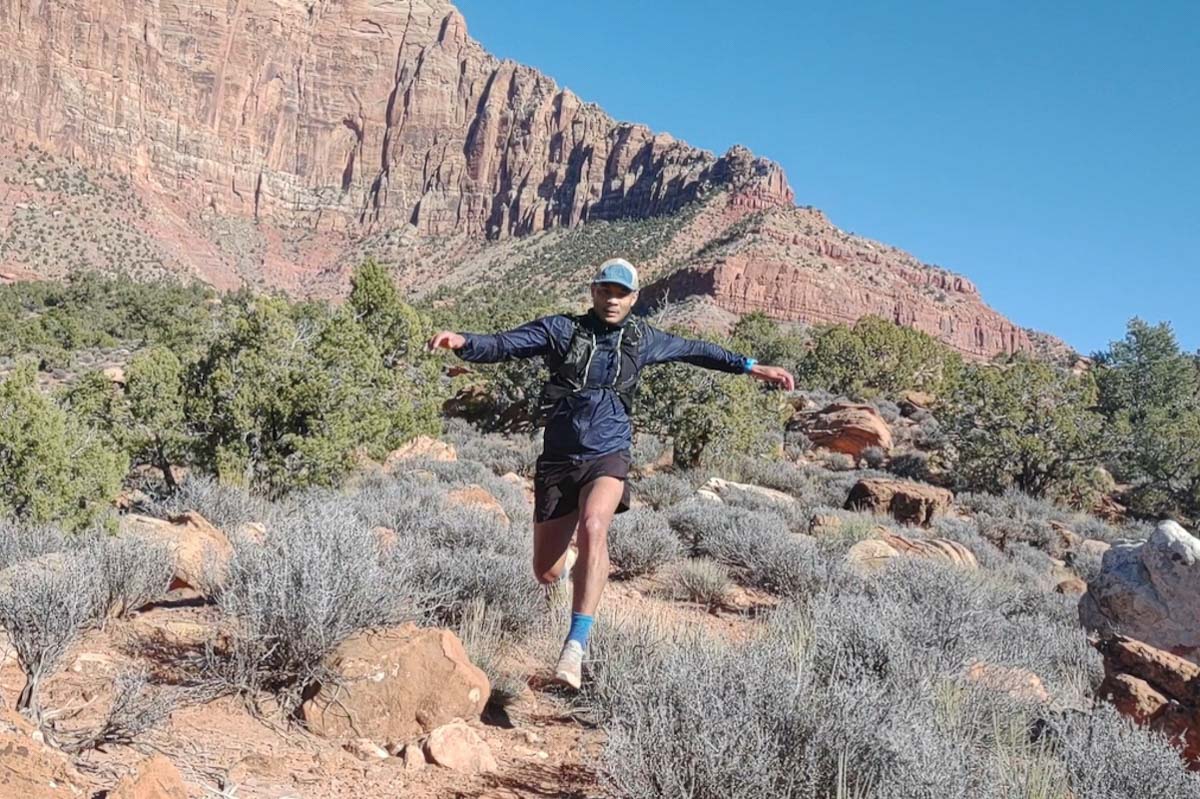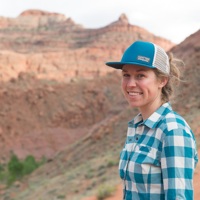Ultrarunner and former race director Abran Moore moved west to Portland, Oregon, five years ago, and loves the adventurous nature of the community — folks are always pursuing exciting bucket list runs, locally or across state lines. He loves that he can simply carry a water filter on the rambling mountain trails: the Pacific Coast Range receives around 200 inches of rain per year. Jade Lake, also known as Necklace Valley First Lake, is a bright turquoise freshwater pool in the Alpine Lakes Wilderness, and one of Moore’s all-time favorite runs.
“The route was exceptional, and the alpine lakes in that area are unbelievable — there are so many lakes and each one is breathtaking on its own. At some point, you’re like, there’s a lake, a lake, a lake, another lake, and another lake … I probably saw 30 lakes,” says Moore, who is well-known among trail running friends for printing out maps to explore wild areas, new routes, and spectacular natural wonders he’s never seen before — and he inspires others to do so, too.
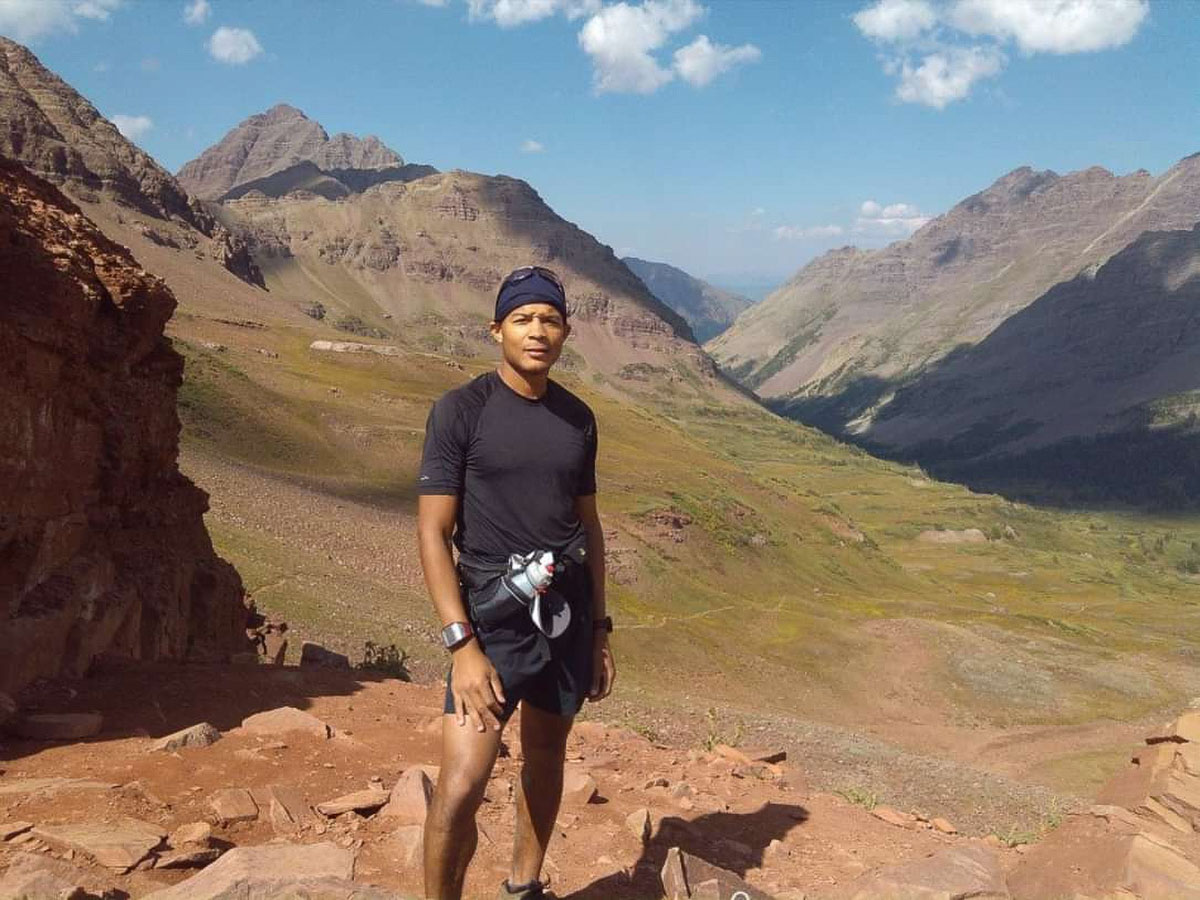
Abran Moore on the Four Pass Loop in the Maroon Bells area of Colorado. All photos courtesy of Abran Moore.
Darian Smith, a trail running mentee of Moore’s, described his impact on the community, “Abran inspired myself and countless others to go for long days in the mountains instead of concentrating on racing. Everywhere he has gone, he has made the running scene better with his adventurous spirit and generosity. He doesn’t race as much anymore, but pursues long days in the mountains. As an African-American, he has no doubt inspired and brought more diversity to trail running.”
Moore says that in the Pacific Northwest especially, “All you need is a couple of gels and a water filter, and you can go anywhere.” His solo routes routinely range from six to over 50 miles, ever-increasing since he raced the Gorge Waterfalls 100k three years ago, his most recent event. He’ll drive a few hours to one of the expansive regions of public land near Portland — the coast, the Smith Rock area, the Upper Cascades, the Olympic Mountains, the area around Bend, Oregon — sleep in his car, wake up for a long run, and drive back to Portland by 8:00 p.m. on Saturday or Sunday night.
“A long run might take you hours because it’s technical, like in the Mount Baker area or the Olympic [range]. I could be going as hard as I can, but there’s route finding, so in two hours, I’ve gone two miles and am covered in dew from the trees,” says Moore, who enjoys most of his runs solo.
His friends who are training for races often have specific training programs and tapers to follow. “I find that I like running, [but] I don’t like running to impact my life. If I want to run 40 miles, I run 40. I try to run whatever distance comes [to mind],” says Moore.
When he’s with friends or a local run group, he says, “I don’t necessarily need to talk the entire time. I like just having someone’s energy around. I’ve done 100-mile races and run with one person for 30, 40, or 50 miles and exchanged five sentences, but we’re feeding off each other’s energy. They might be better on the uphill and me at downhill, and that yin-yang averages out. There’s also a competitive side, as well, of seeing each other push it.”
For Moore, his passion for running for the sake of adventure goes back to the beginning of his running career. He was born and raised in Kernersville, the largest suburb of the Winston-Salem area in North Carolina. He grew up playing baseball, and was one of the only people of color in the sport, he recalls.
“Growing up [playing] baseball, it was rare to see a Black or Hispanic person in Salem. But a lot of times, I don’t even notice. I don’t look around for an identifiable shared skin color. I don’t let that drive me getting out the door. If I want to run a race, I do it. That goes for playing soccer or ultimate frisbee, too. If I want to do it, if you want to do it, just go do it,” says Moore.
He played intramural sports while attending Morehouse College, an all-male, historically Black school in Atlanta, Georgia — don’t worry, he says: an all-female school was across the street. He earned a degree in finance and business administration, then moved back home to work for the family construction business as a project manager and estimator.
“Ever since I was a little kid, I spent my summers at the job site,” he says. He played on a co-ed soccer team, coached softball for a local chamber of commerce team, and played competitive ultimate frisbee, including in regional competitions.
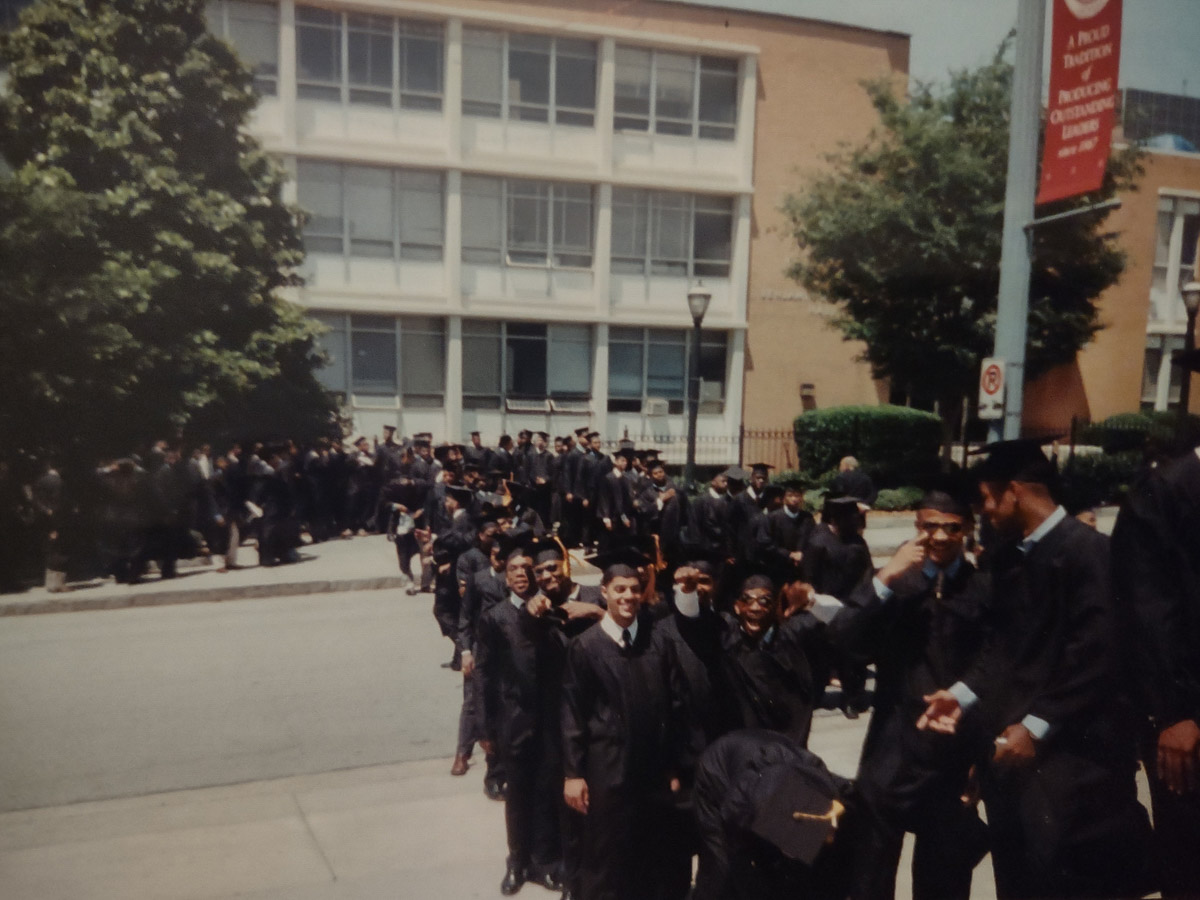
Abran (mid-right, with sunglasses) on his graduation day from Morehouse College.
In 2005, Moore needed a change. “On January 1 of that year, I wanted to see if I could run six miles — that’s all I set out to do. I grew up with a really big yard with big woods that connected to Salem Lake with mountain bike trails, where I grew up riding. It took me two or three hours in there to finish the run. The next day, I walked around eight miles. I had no concept of recovery,” says Moore.
Moore then started printing out maps of bigger trail areas in the region: around Pilot Mountain and Hanging Rock State Park. “I’d print out a map and go run however far and turn back when I got tired. I eventually realized I should turn back before I get tired. I did 36 individual 40 milers by printing out maps and checking out new places over a couple of months,” he recalls.
Moore started learning more about the community through Kevin Sayers’s website, where a race popped onto his radar: the Promise Land 50k, in Bedford, Virginia.
“I thought, if I was going to be competitive, I would carry all my water and food and not stop at the aid stations. Around mile 13, there was a big downhill mile, and I saw David Horton.
He said, “You look good, and the race starts here,” and he looked me dead in the eye. I was walking every hill after that. At mile 26, I came crawling into that aid station eating everything — it was the funniest thing,” said Moore, who ended up running the race 10 times, the last time being right before he moved to Portland.
After that inaugural race experience, Moore started signing up for more races and would do 10 to 12 each year, mostly as “training runs versus efforts,” including several 100-mile races annually. Getting involved with the community of the Promise Land 50k got him hooked on running.
“The race was so far out in the middle of nowhere, that almost all the runners camped [on site]. Several hundred runners got there on a Friday. The race started at 5:30 a.m. the next day, and you’re done by noon. They prepared food for lunch. Once you finished, it was a big community gathering. Everyone hung out talking and laughing it up. By 4:00 p.m., I’d leave and be back home in a couple of hours,” he reflects.
There were only a few trail races offered in North Carolina in January and February — the Uwharrie Mountain Run and the Mount Mitchell Challenge and Black Mountain Marathon — and they would fill up fast.
“I talked with friends and said, ‘What if we started a race to catch all the runners that didn’t get into the races?’ I asked the superintendent of Pilot Mountain State Park what was needed. A permit was 30 or 40 bucks. That was back in 2010,” says Moore, who had a huge learning curve that first year of being a race director. Thus, the Pilot Mountain Pay Back Marathon was born.
Moore lined up coffee mugs and arm warmers as the giveaway, and stocked cans of chicken noodle soup to serve via a crockpot at the finish. He forgot to rent porta-potties. But the race was sold out with nearly 200 registrants and he was ready to help them enjoy the new event no matter what.
“A week before the race, I got a call from a local run store owner asking if I was still hosting the event and he says, ‘Have you not seen the news?’ I turned on the news, and the park superintendent was on the news in gaiters surrounded by two or three feet of snow,” says Moore.
The park superintendent canceled the race due to the parking area, trails, and roads being buried. “I [was] bawling. I went to a wine bar to write my email and send it out, ‘Race postponed due to snow.’ Five minutes later, everyone was asking for a refund: 140 asked for refunds. But it ended up almost full when I rescheduled it, and the racers had a better experience. I reserved porta-potties, ordered pizza, and hired someone to manage the time at the finish line,” said Moore, who continued to be the race director for five years, improving the experience each year with additions: reinvesting the money into the race, hiring a local ham radio group, reimbursing volunteers for travel, and establishing an emergency escape policy. He handed out free issues of Ultrarunning Magazine and Trail Runner Magazine for the full and half-marathon participants.
“Abran really got the ball rolling for the trail running community in North Carolina [around] 2010. When he became the race director for Pilot Mountain Pay Back Marathon, that allowed other races in the area to manifest,” said Darian Smith, adding that Moore encouraged people to pursue big dreams.
“Abran encouraged his close friend, Brandon Thrower of Tanawha Adventures, to pursue race directing, course design, and adventure running,” he says.
Using a similar route in the Pilot Mountain area, Jason Bryant, a good friend of Moore’s, started another race series: the Pilot Mountain Goat race, with seven- and three-mile distances. Another group launched the Pilot Mountain to Hanging Rock Ultra 50k and 50 miler.
“It’s good there are a lot of races up there now, and I recall reading there was even a fat ass race there in the early 1990s,” says Moore, who started ticking off adventure runs across the country. He’d fly out on a Friday, run the route Saturday, then hop on a red-eye to be back Sunday afternoon, including the Four Pass Loop in the Maroon Bells area of Colorado, and rim-to-rim-to-rim in the Grand Canyon in Arizona.
When Moore left his family construction job and moved in 2014, he handed the race over to a friend. Over the course of eight months, as he applied for new jobs, he also ran his highest mileage weeks ever, reaching his peak shape with weekend double runs and 100-mile weeks.
He got a job in Charlotte, North Carolina, but relocated again after one year, moving to the company headquarters in Portland, Oregon, where he still works on the technical assistance team for Viewpoint, a software, hardware, and services technology company.
On the topic of diversity and inclusion in trail running, Moore said, “Ultrarunning is not that diverse when it comes to skin color, but in terms of mindset, I feel there are a lot of different perspectives I appreciate. I have never felt uncomfortable or unwelcome at a run.”
In general, and across all activities including baseball and skiing. “People go places they’re comfortable with, and where they’re not the minority. As soon as they have a friend that does the activity, they can get exposure. I would hardly see someone Black except my dad or family on the ski slopes, but once Black Ski Summit Week came, it was night and day. But it’s also geography-specific and based on where you live. Atlanta, Georgia, and Las Vegas, Nevada are totally different regarding diversity,” explained Moore.
Attending an all-Black school was empowering for Moore and the other students. “I went to a historically Black college and there are a lot of people who go to Black colleges — people want to feel like the majority for four years of their lives. If they’re volunteering or working somewhere, maybe it’s okay to always be the minority, but on a day-to-day basis, hanging out — how often does a person who is a minority get to be the majority? Schools that tailor to that experience provide a space for them to be the majority out of their household. Broadly, I think we can do better but it will take more time,” says Moore.
Recently, Moore enjoyed a two-week road trip exploring new trails around Las Vegas and Henderson, Nevada, Death Valley National Park, Antelope Island State Park, Zion National Park, and the Salt Lake City area.
Moore said, “Some of the most fun routes are the spontaneous ones where I say, ‘I’m here, I might as well check out this run, and I change the plan for the day — like when I stopped on my road trip to run at Antelope Island, and I saw a bison and ran into friends on the trail. Or when I ran outside of Las Vegas, missed my turn to see an arch, and stumbled on hot springs. I’m always trying to find new trails. Often the trails no one talks about are the gems.”
Back home in Portland, Moore can run out to the trails from his front door. Big changes over the past few years, including moving and the COVID-19 pandemic, make him sentimental about how to hold onto the original sense of community that connected him with trail running in the first place while supporting expansion.
He says, “I do know change is necessary and I hope the community and industry continue to evolve. It’s been fast-growing: I look forward to seeing where it goes next and hopefully in a positive direction. From a human standpoint, I wish the people would stay in the community, because it’s the people that keep you here.”
Call for Comments
- Do you know Abran Moore? Share your stories here!
